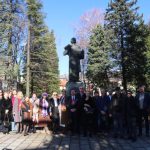STATE ARCHIVES OF MONTENEGRO
Founded in 1953
Funds – 1228 – amount: 9016 meters long
Personal and family funds – 111 – amount: 43 m long
Collections – 142 – amount: in the length of 210 meters
Sixty years of work of the State Archives in Cetinje is an anniversary that binds all but archivists in the first place. That is what a modern society is increasingly expecting from them. We, who are operating in this kind of scientific laboratory and treasury of documentary heritage in Montenegro, we are quite aware of our roles and place in the society. The achievement of Montenegrin archivists obligate us to more versatile and more active engagement in order to secure for the archival profession and service a decent place, status and treatment in the society.
One should not neglect 60-year period since the State Archive has been fulfilling its mission – keep the collective memory of the Montenegrin society, so it is worth the effort to look back and look around. From the archival point of view, even nowdays the archival profession is not valued as it deserves in our society. You should not blame archivists for it. Summarized views over the past 60 years, is a clear evidence of a lot of good endeavors, ideas, plans, projects, etc. which the archival profession has moved, designed, organized and distributed to responsible addresses.
Like our predecessors, despite our efforts, we believe that today we have not been able to impose and emphasize the importance of the archival profession and the service and its place and role in the contemporary society. Realizing that every society has its own needs, interests and obligation to preserve the records associated with its identity, values, accomplishments, etc. the archivists emphasized the importance of their work in order to ensure that they were permanently preserved and transferred in heritage to the younger generations. Unless appropriate conditions and the position of the archival authority are ensured, it is certain that Archives cannot properly respond to the set goals and expectations of the citizens and society in whole.
A modern society and its environment are subject to rapid changes and are producing more and more various documents, putting in front of the archivists more and more complex tasks and obligations. On the other hand, there is no sufficiently clear social awareness of the need for an integral development of the archival profession and service. In the context of these circumstances, the capacity of the archival service is not proportionate to the tasks set before it. By preserving everything that is created and that contains certain information about human activity, it can happen that we manage only to preserve the fragments of the collective memory of our society.
Unfortunately, the problems arising from the archival profession were not essentially considered by the responsible ones as a priority, so that the archival activity did not develop according to the needs of the society and the set up tasks. In addition, although not all the goals have been achieved, a considerable progress has been made, in spite of the fact that the working conditions were not always favorable, and permanent lack of funds is present.
On this occasion an exhibition of documents was organized for the public, which is a comprehensive and complete mosaic of all archival efforts, persecution and enthusiasm, both individual and collective. The very exhibition is the illustration of growth and evolution of this national and archival home institution, and of all those who have grown into archivists under the auspices of the institution. In this sense, it is a kind of homage to the few but valuable archival workers in Montenegro whose dedication to the profession makes the basis of today’s State Archives of Montenegro.
PREDRAG VUKIĆ, A REVIEW OF THE HISTORY OF THE ARCHIVAL SERVICE IN MONTENEGRO
In turbulent history of Montenegro at Court Offices of the dynasties which ruled in this territories (The Vojislavljevich, The Balshichs, The Crnojevichs and Petrovichs), were formed and stored the archival documents. The rich archival material was formed during the past centuries and holded in the headquarters of the resident religious communities acting and operating in Montenegro. (Orthodox Church of Cetinje, Archdiocese of Bar, Kotor Diocese and the Islamic religious community.) Besides the dynastic and confessional archives there are formed even the town archives since the Middle Ages to modern times. However, only after the recognition of the Principality of Montenegro at the Berlin Congress in 1878 as an independent state, the need arises to establish a national archive to keep the records of state institutions. At the initiative of Prince Nikola I Petrovic it was formed in in Cetinje in 1895 the State Archives. Under its jurisdiction were kept archival documents created in the system of state administration of Montenegro. The National Archives was established on the basis of normative legal acts formulated by Filip Kovacevic, manager of the court library. With the Austro-Hungarian occupation of Montenegro in 1916 and the creation of the Yugoslav state in 1918. State Archives as a state institution ceases to exist.
In the interwar period, The State Museum was established in Cetinje, in 1926. As part of the State Museum a separate Archive Department was formed. The same department had no status of legal person, but was formed as a sector of the State Museum. In the Archive department of the State Museum are kept the archival documentation of Petrovich Njegosh dynasty (Court archives), as well as records of former institutions of the Montenegrin government of the time (the Senate, the Ministries: of Interior, Finance, Army, Justice, Education and religious affairs; the Great Court, Main State Controls) and other state administration bodies from the time before 1918.
The formation of the modern archival service in Montenegro began after the end of World War II, by Decision of the Government of the People’s Republic of Montenegro in 1949. It was established the Historical Archives in Kotor at first. In the Kotor archives are stored the records and documents continuously since 1326. to the present days. That is why the archives kept in the holdings of Kotor archives are of great social and scientific importance. State Archives in Cetinje was formed in accordance with the Archival Law of 6. December 1951, which was adopted by the Government of Montenegro.
In the years to come the formation of the municipal archives will be seen: in Bijelo Polje (1955), Herceg Novi (1956), Niksic (1959), Budva (1976), Podgorica (1980), Berane and Bar
(1986). In order to regulate the work of archival service Executive Council (Government) of Montenegro will adopt the 1963 the Law on Archives , and this legal act was replaced by a new law in 1978. However, until 1992 archive service in Montenegro is decentralized and is not merged into a single institution. Archives are independent legal entities. State Archives in Cetinje in 1963 will get a new name: Archives of the Socialist Republic of Montenegro. This title will remain in official use until 1992. While the Archives of SR Montenegro in Cetinje and Historical Archive in Kotor were treated as republican public institutions in the field of culture, the municipal archives are treated as an institution in the system of local government.
Law on Archives of 9 June 1992, established the centralization of archival services in Montenegro. All archive centers were merged into a single institution, the National Archives of Montenegro, with headquarters in Cetinje. The National Archives has acquired the status of the state administration body. In the future few new municipal archives were formed as departments of the State Archives in Cetinje: in Pljevlja, Kolasin, Mojkovac, Andrijevica, Plav, Rozaje, Zabljak, Danilovgrad and Ulcinj. In July 2010, a new Archival Act was adopted, which is now legally binding and normative legal act. This Act hadn’t brought significant changes in the organization of archive services in Montenegro, because it is still a centralized system of archival service, same that was established in 1992 and as such remained unchanged till nowdays.
Acting director:
Danilo Mrvaljević
Tel: +382 41-230-226; +382 67-260-342
Address: Novice Cerovića 2, Cetinje
e-mail: dacg@t-com.me






